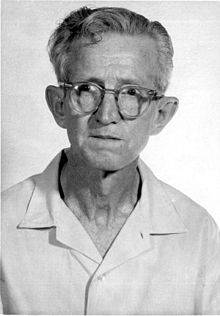The Case That Changed The Court System Came Out of Bay County Florida
Rickey StokesViewed: 6610
Posted by: RStokes
[email protected]
3347901729
Date: Mar 18 2019 4:50 PM
It was 56 years ago today the criminal justice system in America was forever changed. That change came as a result of a man taking a piece of paper and handwriting a document that he filed with the Supreme Court.
The filing was a result of a ruling by a Circuit Court Judge in Bay County Florida ( Panama City ).
As a result of the handwritten motion to the Supreme Court, the right to counsel is a fundamental guarantee and essential to a fair trial.
The case called Gideon verses Wainwright was a ruling by the United States Supreme Court in 1963. All states are required under the 6th amendment of the United States Constitution to provide an attorney to defendant’s in criminal cases when the defendants are unable to afford their own attorneys.
Because of the Bay County Circuit Court Judge’s ruling, the handwritten motion filed resulted in some 2,000 convicted people in Florida alone were freed as a result of the Gideon decision.
Robert F. Kennedy said in 1963;
If an obscure Florida convict named Clarence Earl Gideon had not sat down in prison with a pencil and paper to write a letter to the Supreme Court; and if the Supreme Court had not taken the trouble to look at the merits in that one crude petition among all the bundles of mail it must receive every day, the vast machinery of American law would have gone on functioning undisturbed. But Gideon did write that letter; the court did look into his case; he was re-tried with the help of competent defense counsel; found not guilty and released from prison after two years of punishment for a crime he did not commit. And the whole course of legal history has been changed.
CLICK FOR INFORMATION ON CLARENCE EARL GIDEON
Clarence Earl Gideon was an unlikely hero. He was a man with an eighth-grade education who ran away from home when he was in middle school. He spent much of his early adult life as a drifter, spending time in and out of prisons for nonviolent crimes.
Gideon was charged with breaking and entering with the intent to commit a misdemeanor, which is a felony under Florida law. At trial, Gideon appeared in court without an attorney. In open court, he asked the judge to appoint counsel for him because he could not afford an attorney. The trial judge denied Gideon’s request because Florida law only permitted appointment of counsel for poor defendants charged with capital offenses.
At trial, Gideon represented himself – he made an opening statement to the jury, cross-examined the prosecution’s witnesses, presented witnesses in his own defense, declined to testify himself, and made arguments emphasizing his innocence. Despite his efforts, the jury found Gideon guilty and he was sentenced to five years imprisonment.
Gideon sought relief from his conviction by filing a petition for writ of habeas corpus in the Florida Supreme Court. In his petition, Gideon challenged his conviction and sentence on the ground that the trial judge’s refusal to appoint counsel violated Gideon’s constitutional rights. The Florida Supreme Court denied Gideon’s petition.
Gideon next filed a handwritten petition in the Supreme Court of the United States. The Court agreed to hear the case to resolve the question of whether the right to counsel guaranteed under the Sixth Amendment of the Constitution applies to defendants in state court.
Procedure:
Lower Courts: Bay County Circuit Court, Fourteenth Judicial Circuit of Florida
Lower Court Ruling: The trial judge denied Gideon’s request for a court-appointed attorney because, under Florida law, counsel could only be appointed for a poor defendant charged with a capital offense. The Florida Supreme Court agreed with the trial court and denied all relief.
Issue:
A prior decision of the Court’s, Betts v. Brady, 316 U.S. 455 (1942), held that the refusal to appoint counsel for an indigent defendant charged with a felony in state court did not necessarily violate the Due Process Clause of the Fourteenth Amendment. The Court granted Gideon’s petition for a writ of certiorari – that is, agreed to hear Gideon’s case and review the decision of the lower court – in order to determine whether Betts should be reconsidered.
Ruling:
Reversed and remanded. In its opinion, the Court unanimously overruled Betts v. Brady.
Argued: January 15, 1963
Decided: March 18, 1963
Unanimous Decision: Justice Black (who dissented in Betts) wrote the opinion of the court. Justices Douglas, Clark, and Harlan each wrote concurring opinions.
Reasoning:
The Court held that the Sixth Amendment’s guarantee of counsel is a fundamental right essential to a fair trial and, as such, applies the states through the Due Process Clause of the Fourteenth Amendment. In overturning Betts, Justice Black stated that “reason and reflection require us to recognize that in our adversary system of criminal justice, any person haled into court, who is too poor to hire a lawyer, cannot be assured a fair trial unless counsel is provided for him.” He further wrote that the “noble ideal” of “fair trials before impartial tribunals in which ever defendant stands equal before the law . . . cannot be realized if the poor man charged with crime has to face his accusers without a lawyer to assist him.”
A writ of habeas corpus is used to bring a prisoner or other detainee (e.g. institutionalized mental patient) before the court to determine if the person’s imprisonment or detention is lawful. A habeas petition proceeds as a civil action against the State agent (usually a warden) who holds the defendant in custody.
<- back


.jpeg)




.jpeg)
















 (2)1.jpg)
.jpg)




1.jpg)







1.jpg)












 (1).gif)






.jpg)


















.jpg)



 (2).jpg)



1.jpeg)
.jpg)









.jpg)


















1.jpg)
.JPG)

